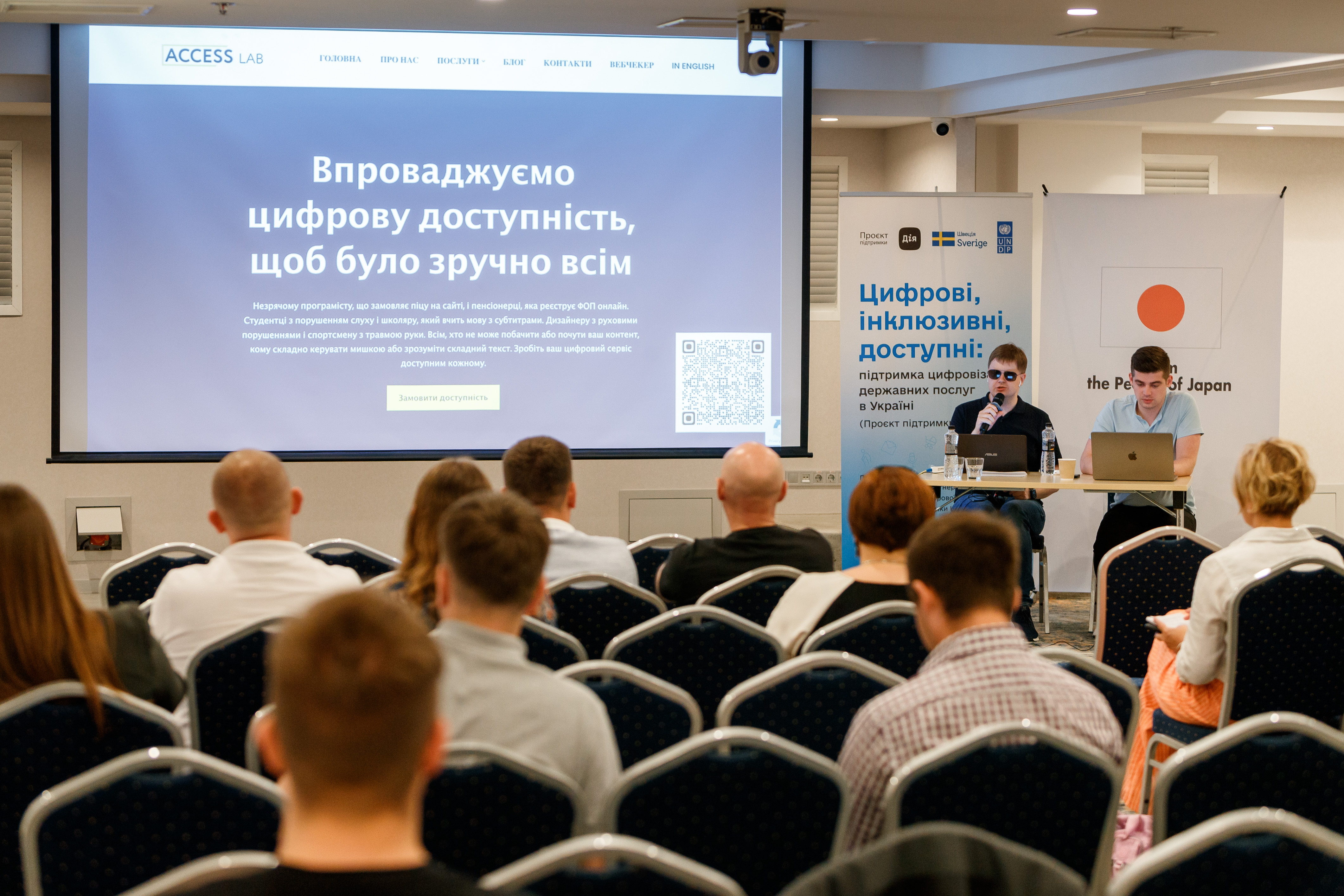Government employees were taught how to write and create publications that can be used by all people, including those with visual impairments.
UNDP and Japan conduct web accessibility training for civil servants across Ukraine
July 7, 2023

The second session in the framework of a pilot regional training course on web accessibility in Lviv, 29 June.
Kyiv, 7 July 2023 – The United Nations Development Programme in Ukraine, with financial support from the Japanese government, has conducted a series of training sessions on web accessibility for civil servants throughout the country. Over two weeks from the end of June into the beginning of July, training was conducted in three cities: Vinnytsia, Lviv, and Poltava.
The training was organized in partnership with the Vinnytsia, Lviv, and Poltava regional administrations, with financial support from Japan and within the DIA Support Project. The project is implemented by the UNDP in Ukraine with funding from Sweden.
In total, more than 500 civil servants from various executive bodies and representatives of local government authorities from 14 regions of the country took part in the training.
Over two days, they were taught how to write texts and create videos, publications and websites in such a way that they are accessible to all people – including those who are blind and use special assistive technologies, such as screen readers.
Mstyslav Banik, the head of Digital Services Development at the Ministry of Digital Transformation of Ukraine, emphasized that the need to ensure the accessibility of web resources for people, in particular those with permanent or temporary impairments of vision, hearing, locomotor functions, has sharply increased because of war.
“We need to build a completely inclusive state, not only in terms of physical accessibility, but also in digital terms,” Banik said. “Our main task as civil servants is to take care of people, so accessibility is one of the main areas that requires our attention.”
Today, all new electronic services in the Diia application or portal are analysed by web accessibility experts at the design stage, Banik noted. So, for example, the new “Diia.Barrier-free” section of the Diia portal, which was launched at the end of last year, fully meets all requirements.
Web accessibility is one of the key areas in which the Ministry of Digital Transformation is working together with UNDP in Ukraine, with the financial support of Sweden. For three years in a row UNDP has been analysing the basic web accessibility of the websites of executive authorities at the central and local levels in Ukraine. The latest analysis in 2022 revealed a positive trend – the number of sites with basic accessibility at an average level or higher has increased – from 61 to 73.
In addition, the Ministry of Digital Transformation, with the support of UNDP and Sweden, has implemented a number of initiatives in recent years to significantly enhance legislation in this area. Thus, on 15 June 2022, a new state web accessibility standard based on the progressive European standard EN 301 549 entered into legal force in Ukraine. After the adoption of the appropriate Resolution by the Cabinet of Ministers of Ukraine, all executive authorities will be required to comply with its requirements. And in order to make it easier for domestic developers to implement them, the Ministry of Digital Transformation and UNDP in Ukraine initiated the first official translation into Ukrainian of the WCAG guidelines, which formed the basis of the new state standard.
Volodymyr Brusilovskyi, the DIA Support project manager, said that conducting regional training in web accessibility for civil servants on site has become another element of the joint efforts of UNDP in Ukraine and the Ministry of Digital Transformation to increase the accessibility of the country's state resources and prepare the authorities for the entry into force of the new legislation on accessibility.
“We live in a digital world, and every year we obtain more and more services online. Therefore, a situation, when a person cannot receive a state service because of a disability, is unacceptable,” Brusilovskyi said. “UNDP in Ukraine, with the support of Japan, initiated this series of training course to support the implementation of international web accessibility requirements in Ukraine, to explain to civil servants how to implement these guidelines, and to help them implement them. This is so that all people have access to the public services they need, and no one is left behind.”
Earlier in February of this year, the Ministry of Digital Transformation and UNDP in Ukraine, with the financial support of Sweden, developed a thematic online course titled “Web accessibility” for the Diia.Osvita portal. It covers all the basic concepts and recommendations for removing common digital barriers. The course formed the basis of the subsequently created “Brief Guide to Web Accessibility,” which contained all the instructions in text form.
Similar training was also conducted for civil servants from the central executive bodies. Recordings of the training sessions can be found on the YouTube channel of UNDP in Ukraine.
Media inquiries
Yuliia Samus, UNDP Ukraine Communications Team Leader, yuliia.samus@undp.org

 Locations
Locations



